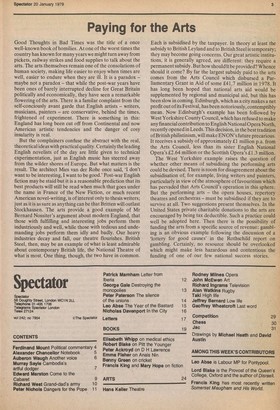Paying for the Arts
Good Thoughts in Bad Times was the title of a once well-known book of homilies. At one of the worst times the country has known for many years we might turn away from pickets, railway strikes and food supplies to talk about the arts. The arts themselves remain one of the consolations of human society, making life easier to enjoy when times are well, easier to endure when they are ill. It is a paradox maybe not a paradox — that while the post-war years have been ones of barely interrupted decline for Great Britain politically and economically, they have seen a remarkable flowering of the arts. There is a familar complaint from the self-conciously avant garde that English artists — writers, musicians, painters — are conservative, behind the times, frightened of experiment. There is something in this: England has long been cut off from Continental and now American artistic tendencies and the danger of cosy insularity is real.
But the complainers confuse the abstract with the real, theoretical ideas with practical quality. Certainly the leading English novelists of the day are little given to technical experimentation, just as English music has steered away from the wilder shores of Europe. But what matters is the result. The architect Mies van der Rohe once said, 'I don't want to be interesting, I want to be good.' Post-war English fiction may be staid but it is a reasonable prediction that its best products will still be read when much that goes under the name in France of the New Fiction, or much recent American novel-writing, is of interest only to thesis writers; just as it is as sure as anything can be that Britten will outlast Stockhausen. The arts provide a good example of Mr Bernard Nossiter's argument about modern England, that those with fulfilling and interesting jobs perform them industriously and well, while those with tedious and undemanding jobs perform them idly and badly. Our heavy industries decay and fall, our theatre flourishes. British Steel, then, may be an example of what is least admirable about contemporary British life, the National Theatre of what is most. One thing, though, the two have in common.
Each is subsidised by the taxpayer. In theory at least the subsidy to British Leyland and to British Steel is temporary; they may become going concerns. Our great artistic institutions, it is generally agreed, are different: they require a permanent subsidy. But how should it be provided? Whence should it come? By far the largest subsidy paid to the arts comes from the Arts Council which disbursed a Parliamentary Grant in Aid of some £41.7 million in 1978. It has long been hoped that national arts aid would be supplemented by regional and municipal aid, but this has been slow in coming. Edinburgh, which as a city makes a net profit out of its Festival, has been notoriously, contemptibly mean. Now Edinburgh's example has been followed by West Yorkshire County Council, which has refused to make any financial contribution to English National Opera North, recently opened in Leeds. This decision, in the best tradition of British philistinism, will make ENON's future precarious. It receives a subsidy of approximately £1 million p.a. from the Arts Council, less than its sister English National Opera's £2.64 million or the Scottish Opera's £1.3 million.
The West Yorkshire example raises the question of whether other means of subsidising the performing arts could be devised. There is room for disagreement about the subsidisation of, for example, living writers and painters, particularly in view of the atmosphere of favouritism which has pervaded that Arts Council's operation in this sphere. But the performing arts — the opera houses, repertory theatres and orchestras — must be subsidised if they are to survive at all. Two suggestions present themselves. In the United States private charitable donations to the arts are encouraged by being tax deductible. Such a practice could well be adopted here. Then there is the possibility of funding the arts from a specific source of revenue: gambling is an obvious example following the discussion of a 'lottery for good causes' in the Rothschild report on gambling. Certainly, no resource should be overlooked which might make less hazardous and contentious the funding of one of our few national success stories.


































 Previous page
Previous page